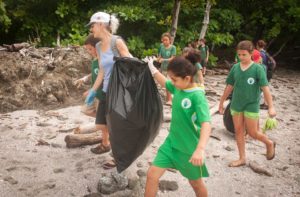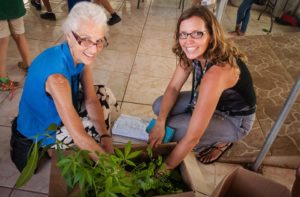Interview with Eileen Waldshmidt:
How did you hear about Futuro Verde?
I heard about Futuro Verde from Lural. Lural, and her husband Alejandro, had been graduate students of mine at Oregon State University in the US over 13 years ago. I left Oregon in 2005 and had not seen Lural in several years. I had heard she had moved to Costa Rica.
Then, in November 2014, Lural contacted me from FV saying that she had seen my name in the La Cosecha Dual Language Education New Mexico Conference Program and she wanted to know if she could stay at my house in New Mexico because she was coming from Costa Rica to the United States to present at the conference. When she came to New Mexico, she told me all about Futuro Verde and how wonderful it was.
Why did you decide to come over here and become a FV teacher?
I came to FV because of Lural. Lural had been one of the top students in the graduate program at Oregon State University and I grew close to her and Alejandro over the years. I have always admired Lural as a very intelligent, well-informed and dynamic bilingual educator and I continue to learn so much from her.
When Lural was in New Mexico telling me about Futuro Verde, she kept saying that I should come teach there. I didn’t take her offer seriously at first thinking maybe she really didn’t mean it and, besides, it would be impossible for me to leave for a year to teach in Costa Rica. But she was serious, and happily it worked out for me to come with my husband and teach at FV for one year and continue to work alongside and learn from Lural again.
How do you think FV educational system impacts children´s lives?
I think Futuro Verde has a very positive impact on children’s lives because it is a strong community of parents and educators dedicated to progressive educational practices that focus on the whole child. Children feel safe, nurtured, and challenged at FV. When FV students graduate, they have a strong understanding of their local context (Cóbano, Puntarenas, Costa Rica) as well as skills and dispositions that will serve them well as they interact with the global community either right here in Cóbano or through travel or through the internet.
How would you describe Futuro Verde´s curriculum? What makes it so different from other schools?
In many parts of the world today, there has been a narrowing of the curriculum because of a belief that what counts is what can be easily tested using multiple choice exams. FV, on the other hand, has a curriculum that reflects more aspects of the total human experience — math, science, social studies, English, Spanish, French, art, music, industrial arts, PE, and more. FV is situated in a rich jungle setting that serves not just as a beautiful backdrop for learning but also as an important resource for the classroom curriculum. Teachers utilize this rich environment to create meaningful lessons, activities, service projects, and field trips to help the students make connections between what they are learning in the classroom to their local context and to the wide world beyond.
What kind of skills do you think FV students acquired during their educational process in here that would benefit in their future life?
First and foremost, because of the diversity among the students and teachers at FV, FV students develop invaluable linguistic and cross cultural skills that will serve them well in the future. FV students also develop strong academic skills across all content areas that are necessary for critical thinking, collaboration, environmental stewardship, and global citizenship.



